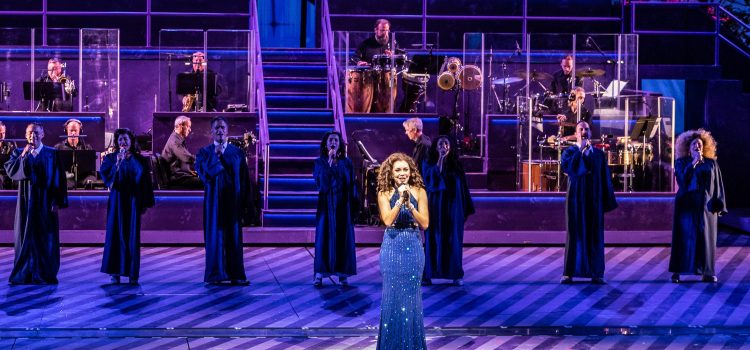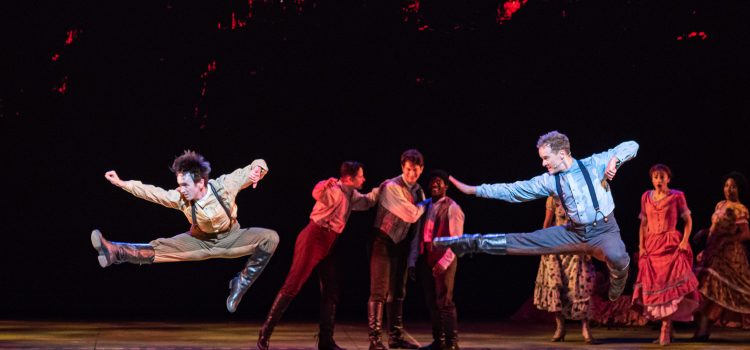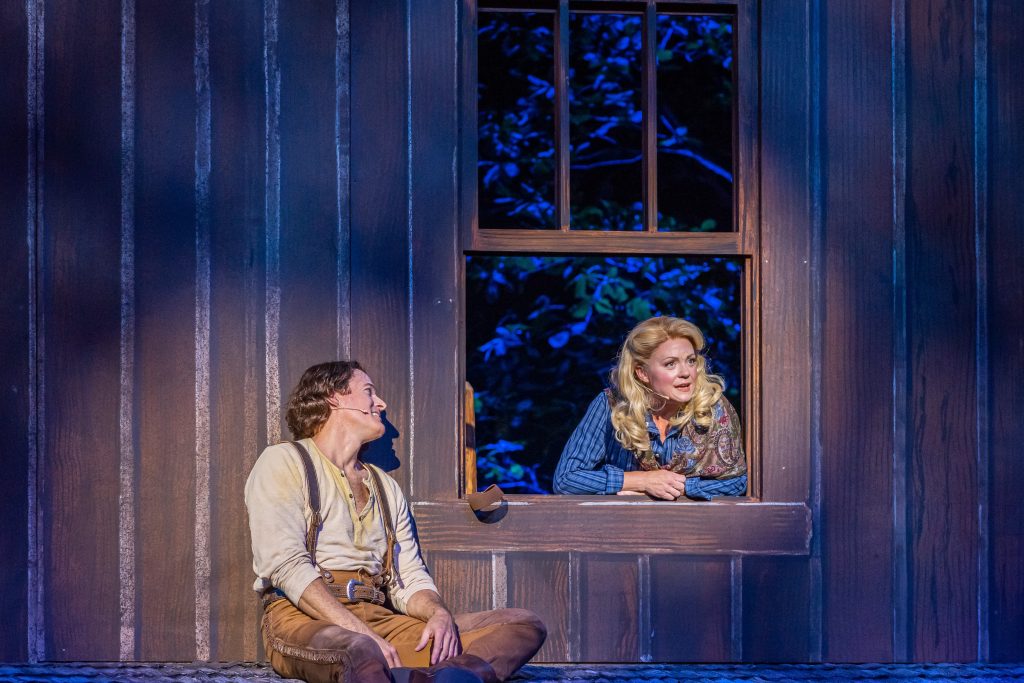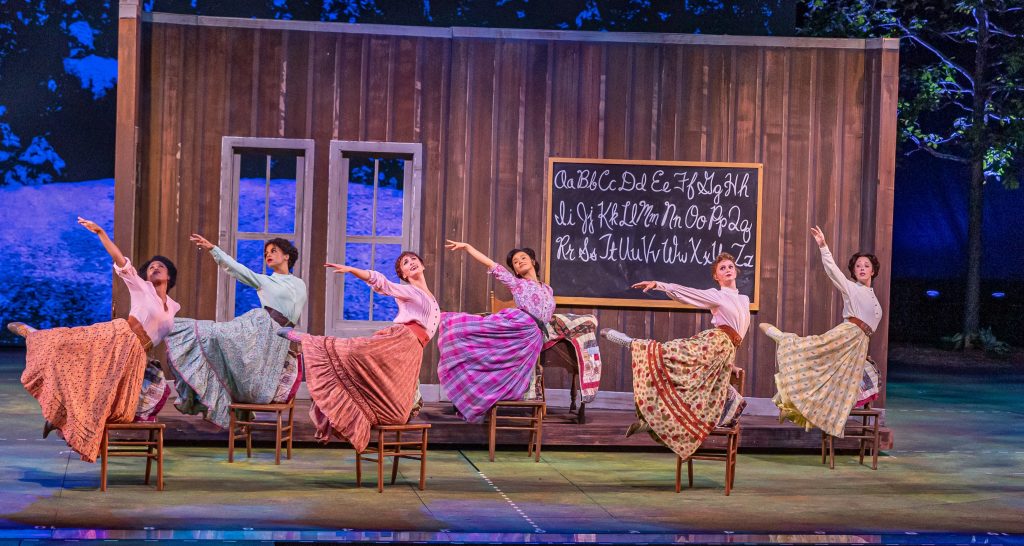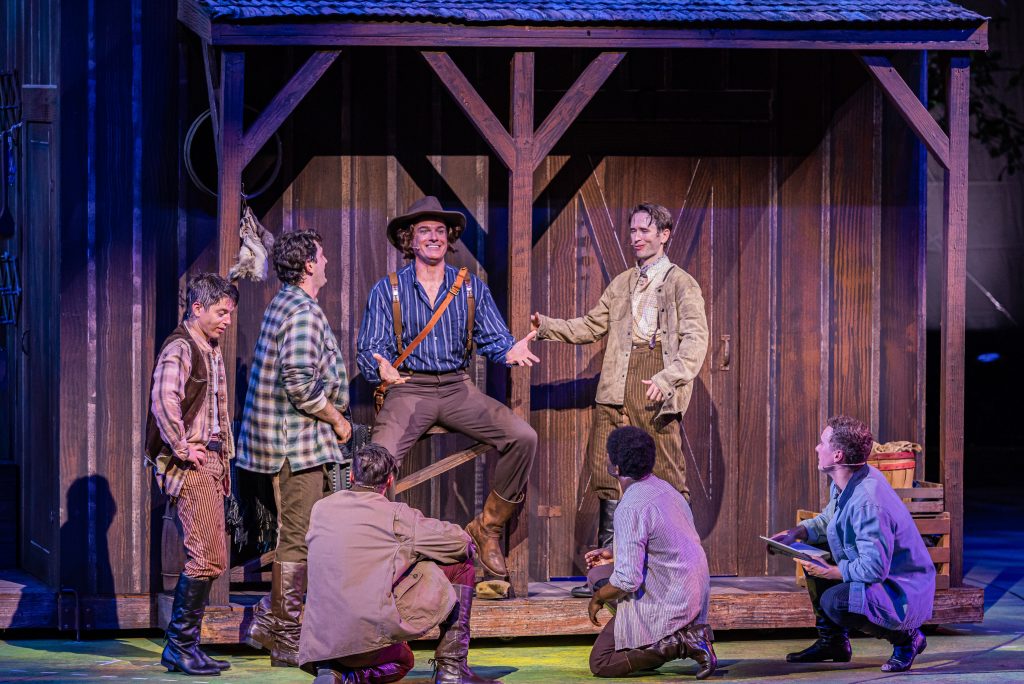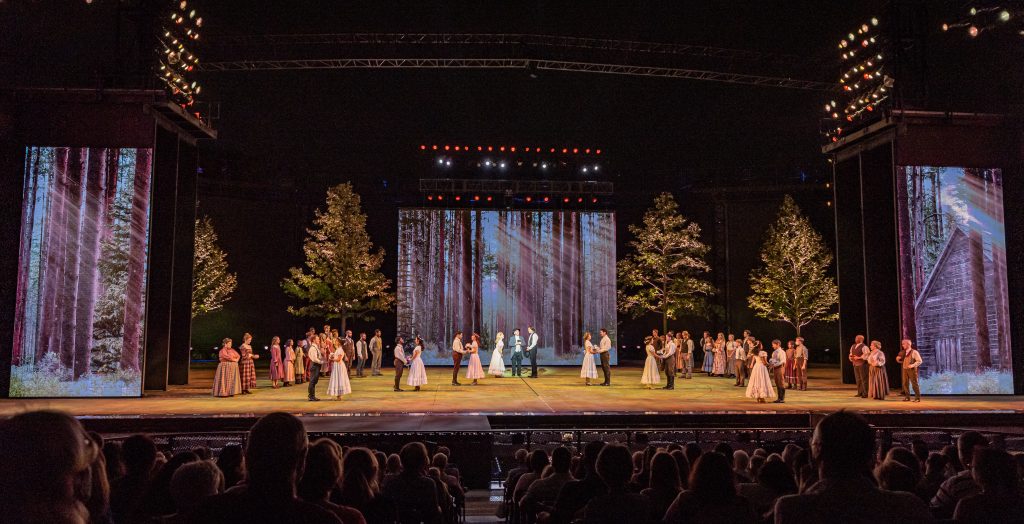By Lynn Venhaus
A refreshing summer breeze took over the Muny for the premiere of the solid-gold Emilio and Gloria Estefan musical “On Your Feet!” and transformed it into an effusive Saturday night Dance Party. Did we need this now or what?
A winning combination of melodic Latin rhythms, heartfelt pop ballads, ebullient dance moves and an only-in-America success story, this electrifying jukebox musical swiftly engaged the crowd, who seemed ready to have the rhythm get them up and on their feet for a rockin’ megamix curtain call.
The winds of change were noticeable opening night on that venerable stage in Forest Park, where it has been a beacon in times of turmoil – and created more than a few memorable moments. Will we remember this night as a turning point? It deserves to be one.
To be sure, it was a fait accompli that also was of historical significance. Looking back at the past decade, this Muny premiere is the most recent work on the schedule, having opened on Broadway in 2015.
While the Municipal Opera archives includes pre-Broadway tryouts and shows imported directly from New York, “On Your Feet!” is also among the shows that have had the shortest time between its Broadway debut and the Muny-produced premiere. For instance, “On Your Feet!” has six years between those markers, only surpassed by “Legally Blonde” — 2007 in NYC and 2011 in Forest Park, and “Newsies” on Broadway in 2012 and at the Muny in 2017. (“Kinky Boots” and “Matilda the Musical” both opened on Broadway in April 2013 and were at the Muny the summer of 2019, and “Shrek the Musical” was in NYC in 2007 and at The Muny in 2013, so all tying the six years’ gap.)
The show also represents a sea change — the first about Latinos by Latinos with a primarily Latino cast. The Estefans are known for breaking barriers, so kudos for this achievement, too.
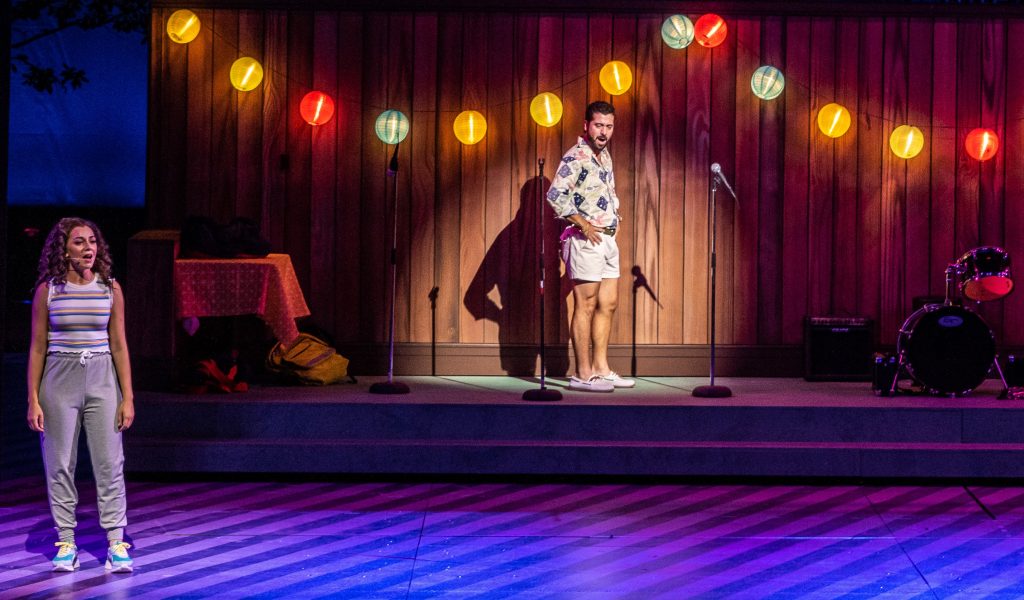
Because the audience of 5,930 wholeheartedly embraced this modern musical, magic materialized and represented something larger in the big picture. After all, the Muny is most importantly about community, and “On Your Feet!” is about what community means – and how determination and everlasting love can get us over insurmountable odds.
There is so much to like about this local production, well-suited for the expansive outdoors stage, not only a showcase for sizzling performances but also as a panorama of cultural heritage.
Based on the remarkable true story of married power couple Emilio and Gloria Estefan (lightning bolts Omar Lopez-Cepero and Arianna Rosario), who met while making music in Miami. Gloria Maria Milagrosa Fajardo Garcia was 17, studying for a degree in psychology.
As leader of the popular group Miami Latin Boys, Emilio recognized her talent, and it was apparent early on they made quite a team. They eventually married, had a son and daughter, and built an international career that resulted in Gloria becoming one of the best-selling female artists of all-time. (75 million records and counting).
Impossible was never in their vocabulary, and the realities of what they overcame makes for a compelling narrative. Above all, their backstory illustrates how enormous hard work and belief in what they offered paid off.
In the 1980s, their Miami Sound Machine music was a revolutionary fusion of Cuban and American cultures and as an early crossover to other audiences, earned worldwide acclaim through its propulsive beats: “Conga!”, “Rhythms Is Gonna Get You,” “1-2-3,” “Get on Your Feet” and “Live for Loving You” lit up club dance floors. Fame and fortune followed, but not without its struggles.
Initially, Gloria shied away from the spotlight, but that exceptional voice demanded she be front and center. The band became known as Gloria Estefan and The Miami Sound Machine, later dropping the group name. Grammy Awards, Presidential Medal of Freedom, Kennedy Center Honors and two Super Bowl halftime appearances are among her accolades.
The ready-made-for-a-musical opened at New York’s Marquis Theatre in 2015 after a Chicago tryout and closed after 746 performances in 2017. Some of the Muny cast and production team were involved in the Broadway show, including music director Lon Hoyt, who makes the music pop with pizzazz.
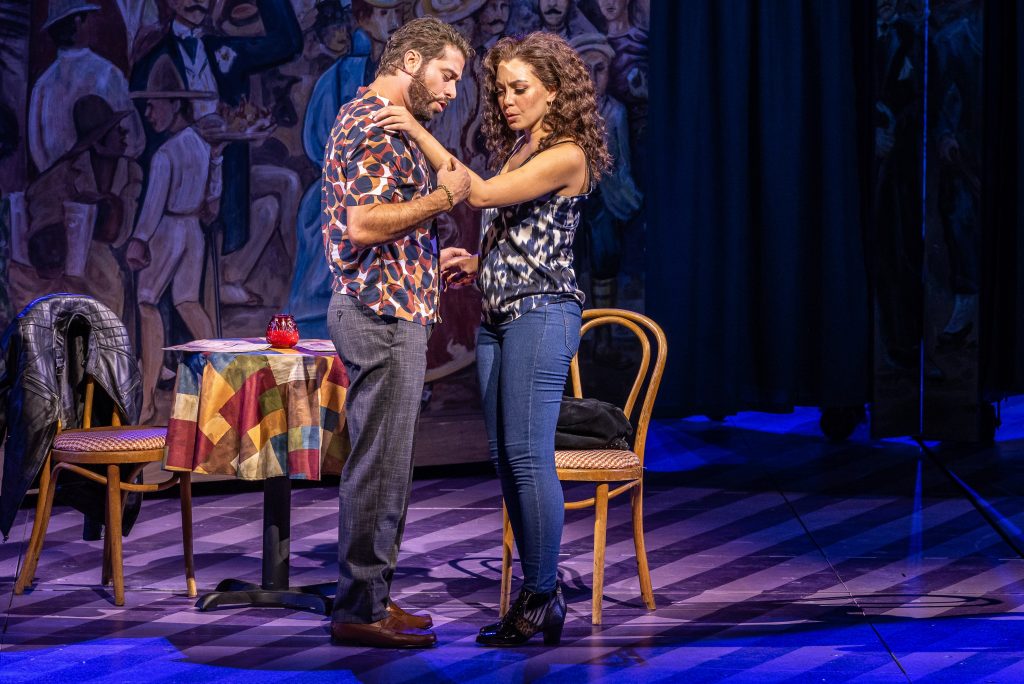
This biopic was immediately elevated by the casting of real-life husband-and-wife Lopez-Cepero and Rosario as the leads. They make a dynamic duo, easily captivating with sincerity, personality and noticeable chemistry.
As the Queen of Latin pop, Rosario is a dazzling magnetic force delivering hit after catchy hit and conveying warmth and courage in the personal life interludes. During the Broadway run, she was an understudy for Gloria and performed as Rebecca, Gloria’s sister, and in the ensemble.
Since his breakthrough performance in the Muny’s 2017 “The Unsinkable Molly Brown” and his tremendous turn as Armando in 2019’s “Paint Your Wagon,” Lopez-Cepero has been notable. Fortunately, he finally gets an opportunity to be in a starring role, and effortlessly rises to the occasion. He was in the original Broadway cast as a supporting player.
He shines as Emilio, who recognized Gloria’s talents and would not be deterred by all the doors shut along the way, opening windows instead and allowing the music to do its magic. His splendid voice soars in “Don’t Want to Lose You.”
Both the Estefans and the headliners project that their marriage is a terrific representation of a true partnership.
Family is a major focus of the musical’s book by Alexander Dinelaris Jr., Oscar winner for co-writing the original screenplay of “Birdman” with Alejandro G. Iñárritu, Nicolás Giacobone and Armando Bo.
The delightful Alma Cuervo, who originated the role of Consuelo, Gloria’s supportive “abuela’ (grandma) on Broadway, endeared herself on the larger stage.
And because there is never a musical biography without conflict, that friction is displayed in the rocky relationship with bitter mom, also named Gloria, whose dreams were crushed at a young age.
As the elder Gloria, Natascia Diaz stands out in song – “Mi Tierra” and with Lopez-Cepero in “If I Never Got to Tell You,” a song written by Gloria and her daughter Emily Estefan for this show.
Locally, Diaz won a Kevin Kline Award for best supporting actress in a musical in 2006 for portraying Anita in The Muny’s 2005 “West Side Story” and was nominated for a St. Louis Theater Circle Award as Velma Kelly in the Muny’s “Chicago” in 2012.
While the book follows the template of many other standard biographies, Gloria’s backstory does include some hefty issues. At age 2, she fled from the revolution in Cuba with her family. In the U.S. military, her father served in the Bay of Pigs invasion and volunteered for Vietnam, and Gloria’s tapes of her singing comforted him on the far-away battlefield.
Martin Sola is poignant as Jose Fajardo, the loving dad suffering from multiple sclerosis. He was also a part of the Broadway production.
Adolescent performers are bright lights — Isabella Iannelli as young Gloria and Jordan Vergara as son Nayib and young Emilio respectively. Vergara made his Broadway debut as an alternate in those roles and continued playing them in the national tour.
There is a fun recreation of a Shriners convention in Vegas, with the two youngsters as tiny Elvis impersonators, and the enitre youth ensemble is a sunny presence in the big numbers.
The multi-generational ensemble is noteworthy – and the diversity reflects how America looks today. Bravo to the casting that recognized talent comes in all different shades and sizes, and for the work by dialect coach Gaby Rodriguez Perara.
Director Maggie Burrows, a Muny first-timer, has deftly pulled all the elements together to keep the story on its toes, fortified with athletic choreography by William Carlos Angulo and Hoyt’s percussive beat. The musicians were a finely tuned machine, and the additional percussion gave the pulsating numbers extra oomph.
Costume Designer Leon Dobkowski’s signature swirling mix of bright colors provided flexibility and were pleasing to watch in motion.
The book’s construction makes it necessary to stage small, intimate scenes – such as a kitchen counter, a bedroom, a dressing room and a hospital bed, so I wish the sound had been better, because at times it was subpar, hard to hear the conversations.
Because of Gloria’s explosive career as an entertainer, scenic designer Tim Mackabee has staged multiple numbers with the pop superstar descending a staircase in headlining diva mode, and the band perched in full view – which lends such a vitality.
As does video segments on the LED screen as an ‘up close and personal’ viewpoint – an ingenious move that offers something new. Kudos to video designer Kate Ducey on the innovative work.
The scenic design also features a minimal but effective use of tropical settings in Havana and south Florida.
Act II features the devastating accident in March 1990, when the Estefans’ tour bus collided with a semi-truck in a snowstorm. Gloria suffered severe spinal injuries, and could have never walked again, but a nine-hour surgery, where they inserted two titanium rods, helped her to fully recover – that and an intense focus on rehabilitation, not to mention the encouragement from thousands of fans across the globe.
The finale recalls the stunning moment when Gloria took the stage at the American Music Awards the next year and sang “Coming Out of the Dark,” which she wrote with Emilio and songwriter/bandmate Jon Secada.
As with any triumph in life, persistence is the key, and this musical exemplifies that, just like Gloria’s album, “Into the Light.”
“On Your Feet!” is a breath of fresh air, a jolt of joy in an increasingly scary world. As the joint was jumpin’ on opening night, this indicated patrons could be receptive to a brand-new day.
How lovely that the universal language of music could soothe our souls at a time we badly need a reminder in the enduring, inspiring notion that America still is the land of hope and dreams.
This summer smile was indeed welcome. And a sweet ending with fireworks after tripping the light fantastic.
“On Your Feet!” is presented nightly at 8:15 p.m. from Saturday, Aug. 21 to Friday, Aug. 27, at the Muny outdoor stage in Forest Park. For more information, visit www.muny.org. For tickets, visit www.Metrotix.com or the Muny box office, from 9 a.m. to 9 p.m. Monday through Sunday at 1 Theatre Drive, or call (314) 361-1900 x1550.
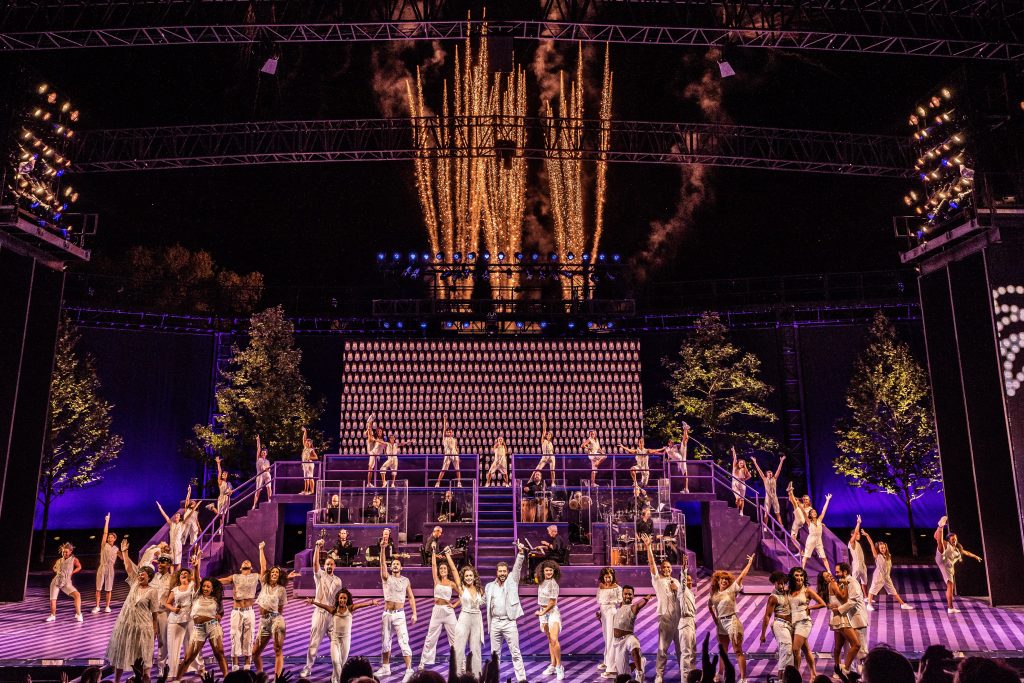
Muny photos by Phillip Hamer.
Lynn Venhaus has been reviewing the Muny since 2009 and professional theater since 2005, and is a founding member of the St. Louis Theater Circle, established in 2012. A longtime journalist, she has had a continuous byline in St. Louis metropolitan area publications since 1978, earning awards along the way for news and features (and an Illinois Press Association award for reviews before they dropped the category). She has taught writing for the media as an adjunct instructor at three local colleges. A graduate of Illinois State University, she has a mass communications degree with a minor in theater. Among her life achievements are sons Tim and Charlie.

Lynn (Zipfel) Venhaus has had a continuous byline in St. Louis metro region publications since 1978. She writes features and news for Belleville News-Democrat and contributes to St. Louis magazine and other publications.
She is a Rotten Tomatoes-approved film critic, currently reviews films for Webster-Kirkwood Times and KTRS Radio, covers entertainment for PopLifeSTL.com and co-hosts podcast PopLifeSTL.com…Presents.
She is a member of Critics Choice Association, where she serves on the women’s and marketing committees; Alliance of Women Film Journalists; and on the board of the St. Louis Film Critics Association. She is a founding and board member of the St. Louis Theater Circle.
She is retired from teaching journalism/media as an adjunct college instructor.

